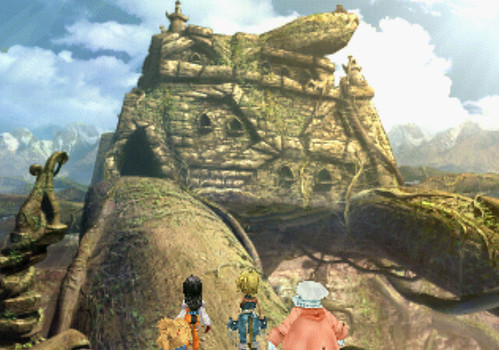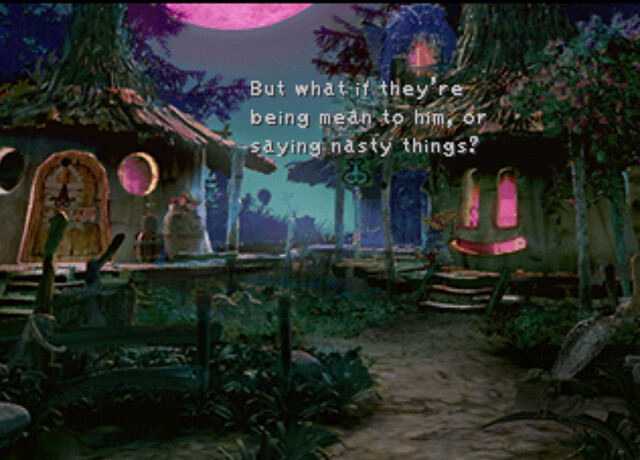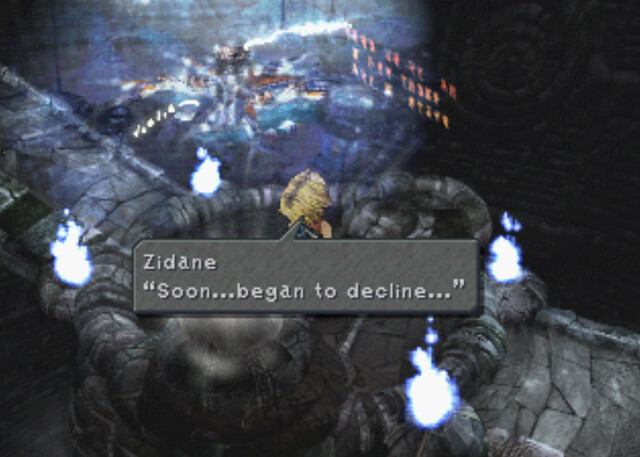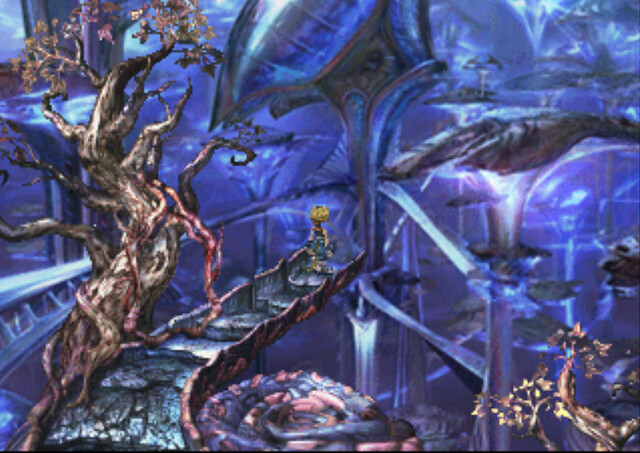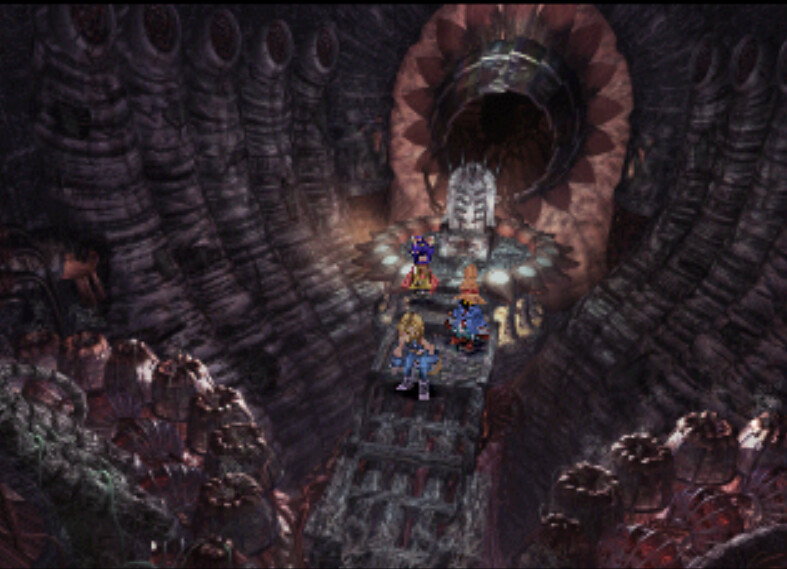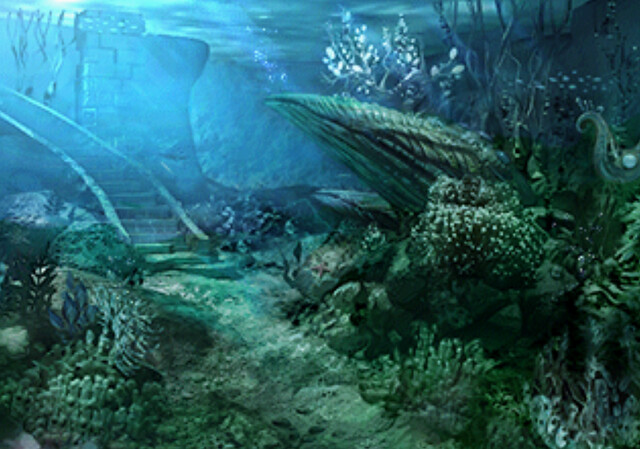Terra is destroyed, the Mist is back on Gaia, and Kuja is probably on his way to end all of existence.
First stop is the Black Mage village, where we leave the Genome. This is probably the best place for them, with the Black Mages knowing how it is to start learning how to work as a society, instead of more-or-less mindless drones. Also, they are basically the nicest people, so the Genomes will have space to grow and develop. For however long, which might be only a few years, considering how it is with the Black Mages and Kuja.
Vivi hopes, that if Genomes and Black Mages can live along each other, that it might be possible for Black Mages and humans too. Which is a sensible approach, you basically give the Black Mages a chance to test it out, how it is to live with another race.
Most importantly, the chocobo egg has hatched, and we see a super sweet scene, where a Genome is scared of the cute, little baby chocobo. And because Black Mages are great with names, they gave it the name Bobby Corwen, and always use both names. I love all about this, but the Black Mage village is made out of delight, anyway.
Before going to the final dungeon, I tackle a bunch of sidequests. First, I collect all the Stellazios for the first time. Not much to say here (I didn't take notes, at least).
Then, I get the special stuff from the auction house - namely the Rats Tail (referencing FF IV), Unes Mirror and Dogas Artifact (both referencing FF III, of course) and the Griffins Heart. By selling them, I get a chance to acquire the Magical Fingertip, which I can exchange for the Excalibur.
The one who takes the Magical Fingertip is some old guy in Daguerreo, and there is a neat little story attached there. He tells us, that the artifact are the fingers of a legendary craftsman named Gogo, who was able to make great dolls. The old man wanted it, so he could make a doll, that looked like his wife. But seeing them, he realizes that these are just really worn-down fingers, just like his own. So, Gogo didn't produce anything magical per se, he was just great at his work, but never gave himself any rest. Like the old man, who lost his wife, while only caring for his work.
Take time for the people you care about, everyone. It's a simple message, but this game, and the series as a whole, is about the importance of the relationships we craft, and that they are the most important thing of them all.
I don't think, the reference to Gogo goes beyond the name, though.
Next, I take on the Behemoth in the weapons shop, and defeat it by making Quina REALLY hard to kill. I don't remember the details, but the Behemoth had no chance.
After that, I did the Mognet sidequest, which was cute and lead me over a bunch of places, once more. And with that, the Moogles can deliver mail again. I don't think there is much more to it, except that I love the moogles here, and that it all was super cute.
With all that done, we take on the final dungeon. Above the Iifa Tree, there is a portal that will lead us to Kuja. When we get closer, it releases a ton of White (silver?) Dragons. Thankfully, we are supported by an airship fleet, lead by Cid and Tantalus, plus Beatrix with the Red Rose. The FMV looked pretty great, too. But that's a given for this game.
Still, we have to fight the weakest incarnation of Shinryu (I have no notes, so I guess he was no challenge), and then get into the portal. Inside, Garland tells us, telepathically, that this is Memoria, a place created out of memories. It looks pretty awesome, there is a walkway in the air, not touching the ground, with only the way forward into a fascinating castle.
The inside looks similar to the outside, at the start, we explore a giant castle, where some of the ultimate weapons are hidden, too. Plus, there are some kind of card ghosts - invincible creatures, that you can only find by seeing the ! above your head, and challenging them to a game of Tetra Master. It's kind of weird, but also a pretty neat touch, I thought. One of them seems to think, he is some kind of final boss, considering how he talks.
After some way, we fight a non-random battle, that is still initiated by just touching a specific place (or, more correctly, crossing a specific line). Considering this is "Malaris", and we fight basically the four Fiends from FF I again, it is very likely a neat, little reference. Not much to say here, except that Zidane died to the final attack, that the boss used after losing all its HP. I think this became a thing here, Zidane kept on dying at the boss battles.
Oh, and a nice thing I already mentioned last time: I think you can take Zidane out of the party, the only time in the game where this is possible. I wonder why. I don't think this is even a reference of any kind. Maybe, considering how memories of everyone are one anyway, how everything is part of the same life source, it might be a bit of "we are all one", so if Zidane isn't in the party, he is still there? Or, rather, this is a battle where the whole world participates in, anyway, no matter if they are physically here, or not.
On the next screen, we see the battle of Alexander versus Bahamut, leaving back only a ruin of the castle, including Brahnes gravestone. Interestingly, at this point, Quina didn't see anything, because they were not there. So, the memories aren't being completely shared yet.
Which changes on the next screen. We see Garnets mother reaching Alexandria, and Zidane wonders, why he can see it, too. The scene after looks amazing, again. Take a look:
Once more, the memory of the horrible eye, that traumatized Garnet so heavily.
Garland continues to talk to us. He explains, that he feared the Eidolons, and wanted to deal with them, before they became too strong. He also talks about a tremendous force, that was summoned to Gaia during the age of war. But with the Gaians not ready to harness that great power, the jewel was broken into four pieces, with the people praying never to see the corresponding Eidolon again.
This is clearly supposed to be Alexander, being the one who is summoned only by Garnet and Eiko together, both using their stones. So, this also was Kujas plan, in the end, to get all the stones and summon Alexander, to get him as his ultimate weapon against Garland.
Remember how the story started, with Garnet taking the jewel piece from Alexandria? Took long, for this plan to get done with, in Disc 3, only to be simply stopped by what was not much more than a handswipe from Garland.
Here, we also fight Tiamat. Who, again, wasn't much of a challenge. I do wonder, why they changed the order of the Fiends, compared to FF I.
After a bit more walking, we see yet another great image:
We see, how Terra tried to assimilate Gaia, 5000 years ago, and failed, due to the live that was already on the planet. The native civilization of Terra died in the process, and their souls were put into stasis, I guess, keeping for whenever the people on Gaia would be dead.
This place might not have the interesting mecanics of Ultimecias Castle, but it has some really great scenery, it looks beautiful. And the concept of going back in time by memory is pretty neat, too.
Next screen, we find what looks like an Ocean, and Quina swimming around to catch some fish, but realizing that they are suffocating. But Zidane explains, that it is all in Quinas mind, which immediately makes them be able to walk around normally, and breathe again. The whole thing is part of the planets memory.
Like the life stream being the whole of life on the planet, with everything being connected, the same is true for memories. With everyone being connected, memories are also shared by everyone. This brings home the pointlessness of immortality even more. No one ever really dies here, everyone is part of the memory of the whole planet.
There is also a hidden boss in this room, Hades. I tried to fight it, but died horribly. Cool design, though, with him sitting on his throne.
We also fight Kraken here. And still, it is the one I have the most trouble with of the four Fiends. It wasn't much of a problem this time, but the first time I played this game, I was a roadblock, and I had to stop for some time, being unable to beat him. No idea how long, but certainly a few days, if not weeks, before I decided to grind and try again. Which just shows, that I didn't get the details of the battle system - the jerk was just too fast for me (which is still a thing, he seemed really fast, even without his tentacles).
A bit further in, we see the birth of Gaia. 5000 years ago. At this time, Terra had reached its peak of prosperity, leading to the hubris of the people there, that lead to their downfall. And Garland was created, to deal with the fallout.
Soon, we find ourselfes in this amazing room:
This is before Gaia. Space. I love Space, how infinite and lonely it looks. This place always reminds me of the anime Odysseus 31 (
here, take a look at the intro - warning: flashing lights). It is the concept of the ancient story, put into a sci-fi concept, and the intro is full 80s anime glory. It might be the first anime I ever saw, and I have an infinite amount of nostalgia points for it.
Anyway, we also fight Lich here. He dies.
I know, that this is the place where you can get the Excalibur 2. I never got it, and probably never will, because speedrunning goes completely counter the way I normally experience games.
We walk into Space, away from the birth of the planet, further back. To the very core, from where existence of everything started. And here, Garland fades away.
I stay with what I said. Garland did horrible things, but I'm not sure how much of that he even understood. He was created as a creature, that was there to serve Terra, and might simply not really comprehend what it means, to be a living being, to be free and independant. He never was.
Zidane certainly seems, like he has maybe not forgiven him, but he cares for Garland. When Garland says his farewell, Zidane screams his name. And Garland tells us, with his last words, that he didn't regret, being born. So, there is something there. Maybe he understood something.
And then, we reach the Crystal, the start of everything. The rest is gone. Not really, but we left it behind. It is still there, we can get back out. But still, we moved back in time to the very beginning of everything. This place feels a bit, like a reference to the very end of FF III, where we end up in a place that was stripped of everything, a world that was consumed by Darkness. It's not the same, but has a related feel to it. It's a whole universe, reduced to it's very basics.
It's the first time, that we see the crystals since FF V. You could probably argue, that the crystal essence of the Espers in VI and the Materia of VII are similar, taking the place of the traditional crystals, but its the first time since V that there is a thing called "Crystal".
At the very end, we find Kuja in Trance form, and the crystal itself. He is ready to destroy the crystal, destroying everything and everyone, the whole of existence, with it. And Zidane calls Kuja out, for being a horrible coward. That, just because he has to die, he shouldn't take everyone with him. Like...I would like to write something here, but the idea of someone not wanting do die (very understandable in itself) leading said person to kill everyone is just such a pathetic move.
I get the fear. But maybe don't ruin it for everyone else. Look at the Black Mages. Look at Vivi. They all are way stronger, than Kuja could ever be.
But before fighting Kuja, we face off against another reference, Deathguise from FF VI. I actually die the first time, because it starts with Meteor, which makes the whole thing a gamble. It's probably possible that everyone just dies in the first round. Not liking this, but the second time, I get through this nonsense.
Next, we fight Trance Kuja, who is soon defeated, too. But still, he manages to defeat us once more with Ultima, before getting knocked out, and thrown out of Memoria.
We never were able to defeat him. He always had more pure strength. And still, we won, because we have friends.
Kuja does mention, that he doesn't care for his defeat. He will die anyway, and then he won't have to be scared anymore. I don't think it's much of a surprise, that this guy is scared of death.
But Zidane isn't dead, the crystal, though, is gone. But there is something else, another bodyless voice, talking:
You stand before the final dimension,
and I am the darkness of eternity...
All life bears death from birth.
Life fears death, but lives only to die.
It starts with anxiety.
Anxiety becomes fear.
Fear leads to anger...
anger leads to hate...
hate leads to suffering...
The only cure for this feat is total destruction.
Kuja was a victim of his own fear.
He concluded he could only save himself by destroying the origin of all things - the crystal.
Kuja's action proves it.
All things live to perish.
At last, life has uncovered this truth.
Now, it is time to end this world.
I exist for one purpose.
To return everything back to
the zero world, where there is
no life and no crystal
to give life.
In a world of nothing,
fear does not exist.
This is the world that all life desires.
So, this is Necron, and he speaks from above, I guess residing in the shining dome of holy light above Zidane and the others. So, he is implied the have some main godhood, some primal one. Giving him light instead of darkness is interesting, but probably just a visual choice.
This guy feels a lot like a reference to the Cloud of Darkness from FF III (plus some resemblance to the Void of V, but that in itself seems a bit like a reinterpretation of the CoD). A being, that is not malevolent, but waits for its time, to fulfill its duty. In this case, a world where nothing exists, to make sure that no one will ever be afraid again. Exchanging the bad sides and the good ones of existing against Nothing.
Sure, there is the fear of death, that all creatures have in some way. And Necrons logic is, that this fear leads to a lot of suffering. Which is just such a one-sided look at it, that it doesn't seem worth the discussion anymore. Sure, there is suffering, but there is also great joy, and if this part is ignored, the whole discussion is pointless. Don't take away joy for everyone.
For another reference, the characters who don't fight give their power for the once that do. Very similar to how FF IV handled the final battle.
Necron looks pretty awesome, and the way he throws out status disabilities makes me remember Neo-Exdeath (which is no surprise, considering he reuses Grand Cross). It also makes him one of the hardest boss battles in the game, at least for me. I didn't die, but had a lot to do with dealing with status problems, despite giving my characters a bunch of resistances.
I remember the other two times I played this game, where this fight seemed incredibly brutal, like I would die every second, but somehow survived, and then suddenly, it was over, and I had one. Short and intense.
This time, it felt longer. But it didn't matter, in the end, he fell, and I didn't die.
After being defeated, he wonders, why we defy our destiny (this word again, it's what we did during the whole game), and we are teleported away, by an unknown force. And Necron, while vanishing, tells us that he will never truely be gone, as long as life and death exist. Yeah, very similar to the CoD.
Similar to the CoD, I like Necron and what he represents. The infinite Nothing, compared to the passion we are fighting for, something that looms over us all the time, due to our tendency for violence. He is always there, waiting. And, in the end, our enemies were always victims too. What we have to overcome is not them, or at least not just them, but a bad core idea, that goes beyond these antagonists. The thing that their way leads to.
So, I think Necron is a very fitting, final boss.
Outside the Iifa Tree, Zidane goes back inside, to find Kuja. He wants to save him, knowing that he could have done the same thing as Kuja, would he have been in his place. We get another nice FMV, before we reach Kuja, who is dying.
This very much reflects Brahnes dying scene. Kuja did horrible things. He is not forgiven, but he is shown kindness. Zidane knows, that it was Kuja who teleported them outside. One act of kindness, shortly before his death. Which does mean something. But certainly, Kuja is more than just the monster that initiated the death of so many people. Without defending his actions (which were horrible), he was a victim to other forces. And he is still someone, Zidane cares for. So Zidane shows kindness. Because no one else did. So that Kuja has one nice thing happening to him.
And with that, we skip a bit ahead.
Similar to how the game started, we are in Alexandria, were someone like Vivi appears, meeting Puck. We see more Vivis appearing. So, appearantly, Vivi found out how to use his magical powers for good, how to create new life, instead of destroying life with it, the way he did during the game.
We see Freya and Fratley, who now spend their lives together, despite Fratley still not remembering her. Not sure how to feel about this. I kind of wished, Freya would have found her peace on her own. But then, that would run counter to the theme of the game, and her arc. It just feels weird, that Fratley is still with her, a bit forced, like we needed this happy end for her. I wished, she would have accompanied Amaranth.
Beatrix, still haunted by everything that happened, leaves the Save The Queen behind, saying goodbye to Alexandria. As mentioned before, I do like this a lot. Beatrix clearly paid a lot for her deeds. Not physically, but there are obviously deep, emotional scars, that won't let go of her. It's surprisingly grim, and would be an ending that makes her much more sympathetic, to me. Like, she acted horribly, but the things she did have deep consequences for her.
We see Amaranth and Lani, going to Alexandria. As mentioned, I wished it was Freya who accompanied him. But I'm glad the game gave Lani a bit of an arc.
We see Eiko, who has been adopted by Cid and Hilda. They, too, want to go to Alexandria, to see a play.
We see Steiner, who waits for Beatrix, telling her not to go. The game makes them into a couple, and I'm not happy with that. It takes away the thing that makes Beatrix arc good, worsening her character. I get it, that someone you care for forgives you, and tells you how important you are, can heal wounds. But still, this seems too easy, and also forced. Dunno, I don't like the romances we get at the end. Maybe that's me, but they fell forced, and the game would work better without them.
Between the scenes, we get some monologue from Vivi, talking about Zidane, saying goodbye. And he ends, by saying his Farewell, after thanking everybody. It's pretty nice, and fittingly bittersweet. The game sometimes feels like a fairytale, but it has these grimmer elements at his side. Which is why I don't like how some of them are taken away by romances. It feels cheep.
And for the last scene, we see "I Want to Be Your Canary", or at least how it ends, in Alexandria. Everyone is here, including a hooded actor, who reveals himself to be Zidane. He was gone for a year (I think), and when Garnet sees him, she jumps into his arms. It's probably relevant, that, while running, she drops her gem, but leaves it for now. Zidane is more important.
This, too, is implied to be a romance, and it's another one that doesn't need to be there. And, honestly, considering the game never actually says that they are a couple, I'll just assume they are good friends with a deep bond. Sorry for the bit of a sour note at the end, but I'm tired of showing emotions in a way in media, that could be interpreted as characters just deeply caring for each other (like good friends do) as "they are clearly a couple".
But enough of that. This is it, FF IX is over. I very much enjoyed my time with this game, I still love the characters and the story, but especially the wonderful world and atmosphere it creates. The writing is fun and sharp, and it has a bunch of actually different looking races. And one of my favourite casts of the series.
As always, one more post, and then I'll take another break. That said, it's quite some time, since I beat the game, so the break might be pretty short. I'm already looking forward, to playing FF X.

